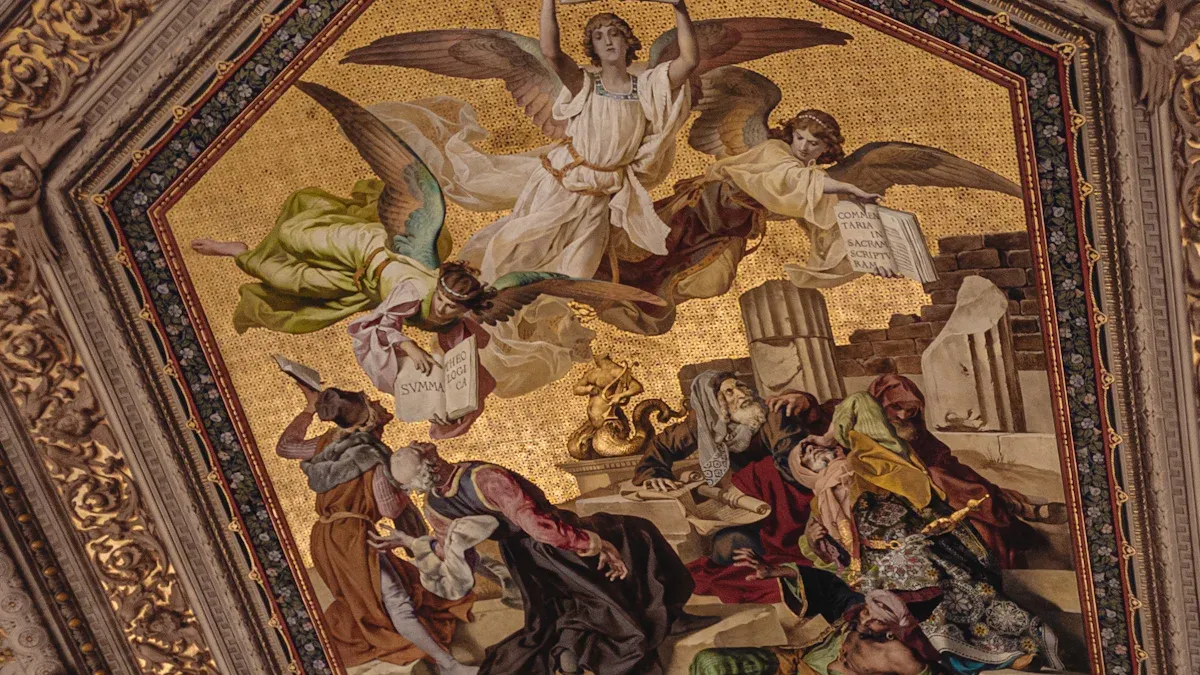
The word “Vertus” has many meanings from history and culture. It often stands for strength, goodness, and greatness. In old writings, it means virtue or good character. In today's world, it can show style and importance. What is the meaning of Vertus? It helps us see how people value honesty, art, and worth over time. This word shows human dreams and links different ideas and traditions together.
Key Takeaways
-
Vertus means strength, goodness, and strong morals in many cultures. Knowing this can help you live honestly and with purpose.
-
The word changed from meaning bravery long ago to now including personal values and creativity. Use this change to grow in your own life.
-
Art and books often show Vertus to teach lessons about right and wrong. Look at these works to think about your own choices and values.
-
Cultures see Vertus in different ways, but they share common human values. Learn about these views to better understand what is right and fair.
-
Being honest and kind can make your relationships better and your life more meaningful. Focus on these traits every day.
What is the Meaning of Vertus?
Etymology and Historical Origins
The word “vertus” comes from Latin roots. It started as “virtus,” meaning bravery, strength, or excellence. In ancient Rome, people used “virtus” to describe courage and good character. Later, it influenced French, where “vertus” means virtues or good qualities.
Long ago, vertus showed how people admired strong character and moral values. Leaders and heroes needed these traits in ancient times. Over time, the word grew to mean inner goodness, not just physical strength. This shows how words connect to values and deeper meanings.
Early Uses in Literature and Philosophy
In old writings, vertus often appeared in talks about right and wrong. Philosophers like Aristotle and Cicero wrote about virtue, which is similar to vertus. They said being virtuous means making good choices and having good habits.
In medieval stories, vertus stood for being morally good. Writers used it to describe honest, brave, and kind characters. These tales taught lessons about living a good life. By reading them, you can see how vertus shaped ideas of good and bad.
Evolution of the Term Over Time
Over time, vertus changed and gained new meanings. Today, vertus can mean personal values or cultural ideas. It might also stand for creativity, honesty, or even luxury. Some brands use it to show elegance and style.
The changes in vertus show how language grows with society. At first, it meant moral strength, but now it includes ideas like identity and beauty. This reminds us that words change as people and cultures evolve.
Cultural and Symbolic Significance of Vertus

Vertus in Art and Symbolism
Art has always been a way to share ideas. Vertus often stands for good values and human dreams in art. Many famous artworks show this meaning. For example, Taddeo di Bartolo’s fresco in San Gimignano shows gluttons in Hell. It compares bad habits with good virtues. This artwork teaches the results of bad choices and the need for living well. Another example is Andrea Mantegna's painting about Virtues and Vices. It shows the fight between good and evil using symbols.
One more example is “Minerva expelling the Vices from the Garden of Virtue,” found in the Louvre. This painting shows virtue winning over bad habits. It celebrates Vertus as a guide for good behavior. These artworks remind us that Vertus is more than an idea. It is a lasting symbol of values that shape communities.
Moral and Ethical Implications
Vertus helps build moral rules in different cultures. Aristotle said virtues grow through practice and habits. He believed good traits like honesty and courage are key to a happy life. This idea still matters today. Studies show moral actions balance personal traits and society’s rules.
Research supports this view. Friedland and Cole (2019) found moral reasons affect choices. This shows self-awareness is important for making good decisions. Etzioni (1986) showed people act based on both pleasure and morals. This means moral rules guide choices even in tough situations. These studies prove Vertus is part of human behavior. It shapes how we see right and wrong every day.
|
Study |
Findings |
Meaning |
|---|---|---|
|
Norms help explain moral choices |
Data is key for moral ideas |
|
|
Etzioni (1986) |
People mix pleasure and morals in decisions |
Shows two sides of human behavior |
|
Aristotle (Dawson, 2015) |
Virtue balances personal traits |
Basis for moral rules in many cultures |
|
Friedland and Cole (2019) |
Moral reasons guide actions |
Self-awareness matters in ethical choices |
|
Delhey and Kohler (2006) |
Happiness depends on social comparisons |
Links morals to how people see their lives |
These studies show Vertus helps people act ethically and live in peace.
Representation in Global Cultures
Vertus is found in many cultures worldwide. In Western ideas, it stands for honesty, bravery, and fairness. You can see this in books, art, and philosophy. Vertus is praised as key to living a good life. In Eastern cultures, Vertus is like “Ren” in Confucianism. Ren means kindness and caring for others. This shows how Vertus reflects different values in different places.
In African traditions, Vertus means working together and respecting elders. It focuses on helping the community. Indigenous cultures link Vertus to nature. They see virtues as keeping balance and protecting the earth. These examples show Vertus is a global idea. It connects people through shared values and hopes.
Learning about Vertus in different cultures helps you understand how moral rules shape societies. It also inspires people to live meaningful lives.
Related Concepts and Broader Connections
Vertus and Virtue: A Comparative Analysis
You might ask how vertus and virtue are alike. Both come from the Latin word “virtus,” meaning strength or good character. Over time, they grew to mean slightly different things. Virtue often means traits like honesty, kindness, or bravery. Vertus, however, has a wider meaning. It can stand for moral values, culture, or personal identity.
Virtue is like the pieces that build good character. Vertus shows the bigger picture. It explains how these traits shape societies, art, and ideas. Comparing these words shows how language captures human values through history.
Similar Terms in Other Languages
Many languages have words like vertus. In French, “vertus” means virtues, focusing on good traits. In Italian, “virtù” also means excellence and moral strength. In Sanskrit, “dharma” is similar. It stands for moral duties and life principles.
In Chinese, “de” (德) matches vertus. It means virtue, morality, and doing what’s right. These words show how cultures value similar ideas in unique ways. Learning about them shows how vertus is a global idea.
Philosophical and Ethical Connections
Thinkers have studied virtues for a long time. Aristotle said virtues are habits you learn by practice. He believed living with virtues brings happiness. Confucius, a Chinese thinker, said moral character creates peace in society.
Today, experts study how virtues affect choices. They look at how personal values and social rules work together. Traits like honesty and fairness help build trust in groups. These ideas show how vertus supports ethical living and personal growth.
Fascinating Facts About Vertus

Trivia and Historical Anecdotes
Vertus has a long and interesting history. In ancient Rome, “virtus” meant bravery and strength. These traits were seen as the best qualities a person could have. Roman leaders used the word to motivate their soldiers. They believed moral strength was key to success. During the Middle Ages, vertus appeared in religious books and philosophy. It stood for honesty and building good character. These writings taught people how to live well and help others.
One cool story is about Renaissance artist Andrea Mantegna. His painting “Virtues and Vices” showed the fight between good and evil. Vertus was the main idea in this artwork. It showed how virtues shape society. Another example is from the French Revolution. People used “vertus” as a slogan for fairness and justice. These moments show how vertus has shaped ideas and actions over time.
Modern Interpretations and Usage
Today, vertus has taken on new meanings. It now stands for excellence in many areas, like art and technology. For example, the luxury brand Vertu uses the word to show elegance and skill in its products. Their designs mix creativity with high quality, showing human excellence.
In philosophy, vertus still sparks talks about moral values. Experts study how virtues guide choices and rules in society. Schools also teach kids about honesty, courage, and kindness. This keeps vertus important for shaping future generations.
Vertus in Popular Culture
Vertus is also popular in movies and books. Stories often show characters growing through virtues like bravery and kindness. Superhero tales highlight these traits, showing how they help overcome challenges.
Luxury brands like Vertu give vertus a modern twist. They use it to mean style and exclusivity. Products like the Quantum Flip smartphone show great design and skill. This connects vertus to both innovation and status.
In music and art, vertus inspires creativity. Artists explore themes of goodness and human potential. This keeps the idea of vertus alive in today’s culture.
The idea of “Vertus” has important meanings in history and culture. It stands for strength, goodness, and doing what is right. These values have helped shape how people live and make choices. In different cultures, “Vertus” shows why honesty and purpose matter in life.
Learning about “Vertus” helps you see its impact on art, ideas, and rules. It makes you think about how these values affect your actions and decisions. Thinking about “Vertus” can inspire you to live with kindness and make a difference.
Think about how “Vertus” and doing the right thing affect your life. How do they guide your goals and relationships?
FAQ
What does “Vertus” mean in simple terms?
“Vertus” means traits like strength, kindness, and good character. It stands for values that help people make good choices. Across cultures, it shows honesty, bravery, and caring for others.
How is “Vertus” connected to luxury brands?
Luxury brands, like Vertu, use “Vertus” to show style and quality. They link the word to great design and high standards. It represents elegance and creative ideas.
Why is “Vertus” important in different cultures?
“Vertus” shows shared values in many cultures. In Western ideas, it means fairness and truth. Eastern beliefs connect it to kindness and peace. Indigenous views tie it to nature and teamwork. These meanings show its importance everywhere.
How does “Vertus” inspire art and literature?
Artists and writers use “Vertus” to talk about right and wrong. Paintings like “Virtues and Vices” and stories about good characters teach lessons. They help people think about their own values.
Can “Vertus” influence your daily life?
Yes, “Vertus” can guide how you act every day. Being honest, brave, and kind helps you build strong friendships. Thinking about “Vertus” can inspire you to live with meaning and do the right thing.







